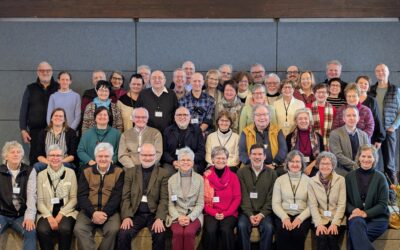 In occasione della On the occasion of the 9th World Assembly of Religions for Peace in Vienna, Austria at the end of November 2013, Maria Voce was nominated as one of the 62 co-Presidents of its World Council. For 43 years Religions for Peace has been promoting dialogue among persons of different faiths and cultures. At the conclusion of the Assembly, Roberto Catalano – of the centre of the Focolare Movement for interreligious dialogue – asked Maria Voce a few questions on the relevance of dialogue among followers of different faiths and the role which the Focolare Movement has and could have in this context. We publish the interview in two parts. Religions for Peace. What was your impression of this experience, given that the Focolare Movement is committed to this since 1982? «It gave me a very good impression. In fact, it answers to the need of the different religions to express support and aid towards peace. I think it’s very important that this inspiration remains: that is, religious principles are always important in building peace. … Peace must come from a vision of the human being and humanity as family, that only religions can give. … I find it right that our movement is also part of this.»
In occasione della On the occasion of the 9th World Assembly of Religions for Peace in Vienna, Austria at the end of November 2013, Maria Voce was nominated as one of the 62 co-Presidents of its World Council. For 43 years Religions for Peace has been promoting dialogue among persons of different faiths and cultures. At the conclusion of the Assembly, Roberto Catalano – of the centre of the Focolare Movement for interreligious dialogue – asked Maria Voce a few questions on the relevance of dialogue among followers of different faiths and the role which the Focolare Movement has and could have in this context. We publish the interview in two parts. Religions for Peace. What was your impression of this experience, given that the Focolare Movement is committed to this since 1982? «It gave me a very good impression. In fact, it answers to the need of the different religions to express support and aid towards peace. I think it’s very important that this inspiration remains: that is, religious principles are always important in building peace. … Peace must come from a vision of the human being and humanity as family, that only religions can give. … I find it right that our movement is also part of this.»  What was your impression regarding the experience of dialogue of the Focolare Movement throughout the world? «An extraordinary impression. Wherever our Movement is present, there are also people of different religions forming part of it. I say wherever because we cannot think of excluding anyone from the sphere of our activity. In fact, as Focolare Movement the goal before us is ut omnes – ‘That all may be one’ as Jesus asked the Father – and in that ut omnes every person finds their place. The contacts we create in our workplace, in families, squares, everywhere, lead us to meet people of different religions. However, the most beautiful thing is that we establish a deep relationship with these men and women …. We’re amazed to see that, together with Christians, there are people of different religious traditions that form part of our movement. The Christians are the elder brothers and sisters because they were the first to start, but they welcome the others in the same family. … A large part of the Catholic episcopacy has great esteem of the Focolare Movement, because it realizes the possibility of establishing relationships with people of different religions. This is very important for bishops who are working in countries such as India, for example, or other parts of Asia. In fact, it means counting on someone who proposes a Christianity that is open, that is not closed in defending itself, a Christianity of dialogue and collaboration and not of conquest.» (second part) Read the complete interview on Città Nuova online (in Italian)
What was your impression regarding the experience of dialogue of the Focolare Movement throughout the world? «An extraordinary impression. Wherever our Movement is present, there are also people of different religions forming part of it. I say wherever because we cannot think of excluding anyone from the sphere of our activity. In fact, as Focolare Movement the goal before us is ut omnes – ‘That all may be one’ as Jesus asked the Father – and in that ut omnes every person finds their place. The contacts we create in our workplace, in families, squares, everywhere, lead us to meet people of different religions. However, the most beautiful thing is that we establish a deep relationship with these men and women …. We’re amazed to see that, together with Christians, there are people of different religious traditions that form part of our movement. The Christians are the elder brothers and sisters because they were the first to start, but they welcome the others in the same family. … A large part of the Catholic episcopacy has great esteem of the Focolare Movement, because it realizes the possibility of establishing relationships with people of different religions. This is very important for bishops who are working in countries such as India, for example, or other parts of Asia. In fact, it means counting on someone who proposes a Christianity that is open, that is not closed in defending itself, a Christianity of dialogue and collaboration and not of conquest.» (second part) Read the complete interview on Città Nuova online (in Italian)
Look after Creation
Look after Creation




0 Comments